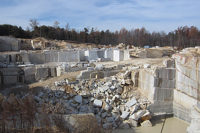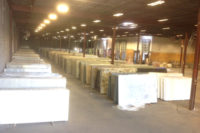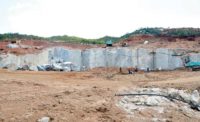2020 ended on an upswing for global stone producer Polycor with the acquisition of North Carolina Granite Corp. (NCGC). Founded in 1889, NCGC is recognized by architects and other industry stakeholders for its high-quality White Mount Airy granite, proudly quarried in Mount Airy, NC. This stone is famous throughout the industry for being one of the brightest, most uniform and highest quality white granites in the world.
Stone World asked Polycor CEO Patrick Perus his thoughts on the addition of another renowned quarry to the Polycor family, as well as what is on the horizon for Polycor on a broader scale.
SW: Polycor has certainly expanded over the years. What do you think are some reasons for the company’s success?
PP: I think we can all agree that the natural stone industry is fragmented. Our vision of unity and our capacity to bring all stakeholders together is what sets us apart from the competition. Our success also relies on choosing the right stones to be added to our portfolio. We are aiming to add the stones that have history, and a proven track-record in terms of quality, durability and beauty. As the world’s largest quarry owners, our ability to control the quality from quarrying to distribution is the key to our success. Our aim is to also build a world leader in America. We have become good at putting companies together, learning from each other and growing together.
SW: What are some considerations when scouting out an acquisition?
PP: There are many things to consider before a merger or acquisition. I would say the most important things for us are:
- The stone must complement the current product offer we have.
- The vision and the mission of both companies must be compatible.
- The finances of the company must be in order and be profitable to make sense in our investment portfolio.
- The geography and physical location must help our growth and expansion in new markets or communities.
SW: Specifically, what were some reasons for purchasing NCGC?
PP: The acquisition of North Carolina Granite Corp. expands our footprint in the U.S. and brings its famed White Mount Airy granite into the Polycor fold, further strengthening our product offering to the construction industry and increasing our presence in the south, specifically in North Carolina which is a dynamic and growing state.
SW: How does this quarry fit into the Polycor “family”?
PP: This acquisition increases our capacity in granite curbing. Green Infrastructure is also a growing trend, and we believe in the future of the use of stones in curbing, pavers, etc.
SW: Do you have any immediate plans for the quarry? If so, what are they?
PP: NCGC is joining the Polycor family, and we welcome the team with open arms. In Q1 of 2021, we will be integrating NCGC to Polycor which represents a tremendous opportunity to get to know each other, learn from each other and exchange best practices. NCGC has tremendous expertise and an outstanding reputation. We cannot wait to start working together in the beginning of 2021. We want to expand and increase production there. When you own 50+ quarries and extract roughly 5 million cubic feet of stone per year, it is safe to say that we know a thing or two about quarrying, and we believe this quarry has tremendous potential.
SW: With so many quarries of different varieties worldwide, Polycor is a leader among natural stone producers. What are some ways you promote the beauty and sustainability of natural stone to specifiers?
PP: Polycor is the world leader when it comes to promoting the beauty and sustainability of natural stone. In 2020, we invested time and money in sustainability; a few highlights:
- Launched a new sustainability campaign, Naturally Sustainable™
- 10 Polycor sales representatives became LEED® Green Associates
- Partnered or sponsored the Green Building Council of D.C., Illinois and Canada
- Produced six Health Product Declarations, so our customers understand the impact of our product on people’s health
- Have a total of 10 ANSI NSC 373-certified sites, two have been added in 2020: Bethel White, Vermont and the Eureka Quarry (Indiana limestone), Indiana; two more will be certified next year, which will help architects get LEED points for their projects.
Every month, our customers, and employees, can read articles about sustainability in our monthly newsletter called Set in Stone.
The list goes on and on about what we do to promote natural stone as a sustainable material. Stay tuned for a big announcement we will make about sustainability in 2021.
SW: Do you find that natural stone is still in high demand?
PP: Yes, we feel natural stone is part of the conversation more than ever. With the current pandemic, we’ve seen an unprecedented will to use locally quarried natural stone across Europe and North America. American quarriers now have an opportunity to convince architects, designers, contractors, fabricators and distributors that local natural stone has many tangible benefits – it reduces their carbon footprint, impacts the environment and encourages the local economy.
SW: What long-term plans do you have for NCGC?
PP: A select number of Polycor employees are planning to join the NCGC operations to help exchange best practices.
North Carolina has the expertise that we are interested in, managing small and complex projects, and giving value to quarry waste which is a major challenge in our industry. They sell 100% of what they quarry, which is quite amazing. They are also known and recognized for their custom-made granite curbing. The NCGC location will become a center of expertise for us in this domain. We have a lot to learn from them, and I believe being part of the Polycor Group also brings new ambitions for the NCGC team.
SW: Overall, are there any future plans for Polycor that you would like to share?
PP: Putting natural stone back at the center of the construction industry is a key objective. Not only do we want the stone to be decorative, we also want it to be a key element of all construction projects, including infrastructures. You cannot “de-carbonize” the economy if you do not change the way we build things. We want to be trend setters and instigators in this coming revolution. This may be a long shot, which we understand, but we have the energy and the right people to address this challenge.







